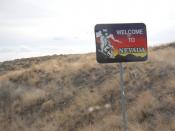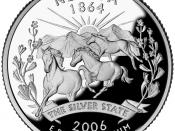Axia College University of PhoenixEvery year hospitals need more registered nurses. Between 2004 and 2014, more than 2.1 million nursing positions will become open to meet the growing demand for medical care or to replace nurses that retire. Hospitals administrators are voicing concerns about a nurse shortage, and some are even declaring a crisis in nurse understaffing with the nurses themselves becoming increasingly worried about it. The shortage in nurse staffing is greatly related to wages that nurses earn. With hospitals employing more than three fifths of the entire nurses in the country, hospitals should provide a higher wage and better work conditions for nurses. This will ultimately increase the staffing shortage in nurses hospitals endure today, as this can create a wider demand of new prospects. We will then look at how wages and work conditions affect nursesÃÂ supply in todayÃÂs market.
Over the late 1990ÃÂs, and in the 2000ÃÂs, nurses pay did not increase at all, even though some hospitals where worried at this stage about nurse staffing shortage in 1997 (Lowell, 2006).When
hospitals decided to beg a wage increase to nurses responded promptly, and hospitals added 186,500 nurses between 2001, and 2003. In Nevada, there are fewer nurses as a proportion of its workforce than just about anywhere else in the country. Some hospitals have already started putting a divert status due to the shortage of nurses. Nevada has a shortage of around 1800 nurses, and the state is believed to have extremely bad problems in the future due the staffing shortage.
In California, wages are higher than in Nevada, but because Nevada does not have a state income tax as does California, nurses can make more money in Nevada. The hospital trade group of Nevada spends each year three million trying to recruit more nurses to come to Nevada, and the state of Nevada spends over 1 Million Dollars in Scholarships to attract more people into filling those vacancies and compounding the problem. It happens because many of the people, who move to Nevada, the nationÃÂs fastest growing state, are either retired or close to retirement and of course require medical attention. Eventually demand out weighs supply in Nevada.
The Nevada legislature recognized the problem when it authorized some money to try to double the enrolment at the University of Nevada systems nursing schools. The Nursing Union of Nevada expressed that if hospitals in Nevada would increase wages and the work environment, this would attract more nurses to the state. Nurses working in the state do not last for too long because they get tired of the working conditions and the low wages. They tend to change professions after a few years, while the hospitals who conduct business in Nevada expressed that their primary objective is to provide excellent care to all patients, but acknowledge that there is a shortage in supply of nurses vs. demand from patients.
The median hourly pay scale by job in the state of Nevada per hours is as follows, for a Certified Nurse Assistance 12.17 per hour, Licensed Practical Nurse-20.21 per hour, Registered Nurse-27.95 per hour. The median pay scale by years of experience in the state of Nevada for nurses is as follows: Less than 1 year-12.47 per hour, 1 to 4 years-14.15 per hour, 5 to 9 years-16.27 per hour, 10 to 19 years-18.59 per hour, and more than 20 years-20.68 per hour. The city of Las Vegas pays a medium salary of 15.95 per hour for nurses, with Elko paying 18.02 and Reno paying 16.24; clearly more than what the wages are in Las Vegas. (Nevada Pay Scale, 2007)In February 2007, the representatives of the Valley Health System and the Service Employees International Union successfully concluded a long time labor negotiations for an increase in wages for nurses. The contract negotiation included 800 nurses, and 110 technicians at Desert Springs and Valley hospitals with the new agreements calling for a 5% increase in salary for the first year and 3% increase there after, with union officials stating that nursesÃÂ salaries in Nevada will increase an average of 20% (Nevada Pay Scale, 2007). Nurses in the intensive care units will be able to see increases raging to 32.09, and 39.61 per hour, but hiring more staffing members will not be likely. Working within a short staff work environment will likely be the trend, nevertheless nurses and Union officials are extremely happy that they were able to increase wages for nurses in the state of Nevada. Even though it is likely that nurses will work short staff, at least some argue they will be compensated accordingly. The Service Employees International Union is still trying to push the issue of staffing at hospitals of the state, claiming another debate with Valley Health. Even the mayor of Las Vegas Oscar Goodman said that that was a great day for Southern Nevada and that he was really the happiest mayor in the universe. Nurses are the guardians of the well being of folks in our community who need health care. I feel much safer tonight knowing our nurses are happy.
ReferencesLowell, V. (2006). Solving the Nursing Shortage trough Higher Wages. Institute for Women PolicyÃÂs Research. Retrieved January 28, 2010, fromhttp://www.ivpr.orgNevada Pay Scale. (2007). Hourly Rate Survey. Retrieved January 27, 2010, from http://www.payscale.com/research/US/state=Nevada/Hourly_Rate




